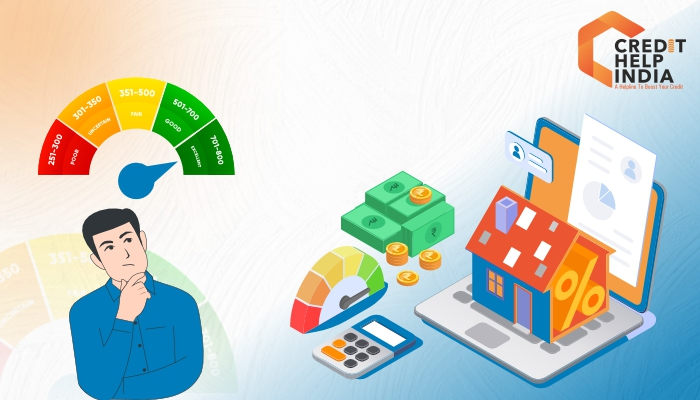How Much CIBIL Score Is Required for a Home Loan

Introduction
With home loan interest rates starting from 7.35% per annum across leading lenders in October 2025, thousands of families are stepping forward to secure their piece of property.
However, there's one three-digit number that stands between aspiration and approval - YOUR CIBIL score.
Understanding how much a CIBIL score is required for a home loan has become as important as knowing the property price itself. The banking sector has tightened its lending criteria, and whilst home loan schemes continue to evolve, one thing remains constant that is creditworthiness, which determines not just whether you'll get approved, but how much you'll end up paying over the next 15 to 30 years.
This detailed guide walks you through everything you need to know about CIBIL scores and home loans, helping you position yourself for the best possible approval.
Key takeaways -
- A CIBIL score of 750 and above is ideal for home loan approval, ensuring faster sanction and lower interest rates.
- Lenders classify scores into zones: 800+ excellent, 750–799 safe, 700–749 acceptable, 650–699 grey, and below 650 challenging.
- Even with a low CIBIL score, housing finance companies and cooperative banks may approve loans if income and collateral are strong.
- Your repayment history and credit utilisation form nearly 65% of your credit score — focus on these to raise it effectively.
- Before applying, check and improve your CIBIL score. Disciplined repayments and low credit usage can secure better loan terms.
Why CIBIL Score Matters for Home Loan Approval
Your CIBIL score matters for a home loan because it tells lenders how trustworthy you are with credit.
It shows your past repayment habits, loan history, and overall financial discipline, helping banks decide whether to approve your loan, how much to lend, and at what interest rate. A higher CIBIL score means lower risk for the lender, faster approval, and better loan terms for you.
In India, banks use your CIBIL score as the first checkpoint before evaluating your income or property. An ideal CIBIL score for home loan approval is around 750, and above that builds confidence, while a low one can delay or even block approval.
Beyond Yes or No: The Quality of Approval
The CIBIL score doesn't just determine whether you get approved; it determines how well you get approved. Two borrowers with identical incomes and identical loan requirements can receive very different offers based solely on their credit scores.
The Government's Recent Stand on Credit Score :
In a significant development, the government has instructed banks not to make CIBIL scores mandatory for first-time borrowers, recognising that many Indians, particularly in tier-2 and tier-3 cities, have limited credit histories.
However, this doesn't mean your score doesn't matter; it means banks will look at alternative parameters like income stability, employer reputation, and family background more closely if you're new to credit.
How Much CIBIL Score is Required for a Home Loan?
800-900: The Excellent Zone
You're among India's most creditworthy borrowers—someone who has demonstrated perfect credit behaviour over the years.
What will you get with this credit score?
- Pre-approved offers without application
- Lowest interest rates available in the market
- Up to 90% LTV ratio
- Minimal documentation requirements
- Instant approvals
- Priority service
- Waiver of processing fees (in many cases)
- Option to negotiate customised repayment structures
750-799: The Safe Zone
You're a responsible borrower with strong credit habits and negligible risk.
What will you get with this credit score?
- Smooth approval process
- Competitive interest rates (typically within 0.10-0.25% of the lowest available)
- 80% LTV ratio
- Standard documentation
- Approval within a short period of time
- Good chances of top-up loans and additional facilities
- Reasonable negotiation power
700-749: The Acceptable Zone
You're creditworthy but perhaps with minor issues or limited credit history.
What will you get with this credit score?
- Good probability of approval (70-80%)
- Interest rates are 0.25-0.50% higher than the best rates
- 75-80% LTV ratio
- Standard to enhanced documentation requirements
- Approval within weeks
- May require a co-applicant or guarantor for larger loans
- Limited negotiation flexibility
650-699: The Grey Zone
There are red flags in your credit history, perhaps delayed payments, high credit utilisation, or recent credit enquiries.
What will you get with this credit score?
- Approval probability drops to 40-50%
- Interest rates are 0.50-1.00% higher than the best rates
- 70-75% LTV ratio (requiring larger down payment)
- Extensive documentation required
- Co-applicant often mandatory
- Longer processing time (4-6 weeks)
- Possible additional collateral requirements
- Very limited negotiation power
550-649: The Challenging Zone
Significant credit problems exist, including multiple delayed payments, settlements, or high debt burden.
What will you get with this credit score?
- Approval probability below 30%
- Interest rates 1.00-2.00% higher (if approved)
- Maximum 60-65% LTV ratio
- Substantial down payment needed (35-40%)
- Co-applicant with excellent credit is mandatory
- May require a guarantor with property
- Processing can take 2-3 months
- Smaller loan amounts sanctioned
- Possibility of rejection despite meeting income criteria
Below 550: The Rejection Zone
Severe credit distress, defaults, write-offs, ongoing legal disputes, or consistent payment failures.
What to expect with this credit score?
- Rejection probability above 90%
- Even if approved, interest rates are prohibitively high
- Maximum 50% LTV ratio
- Large down payment required (50%)
- Multiple co-applicants needed
- Substantial collateral required
- Only specialised lenders might consider
While the minimum CIBIL score required for home loan approval differs across lenders, most Indian banks and NBFCs consider anything above 750 a strong score for easy approval and better interest rates.
Here are the banks and their required credit scores :
| Lender/Banks | A minimum CIBIL score is usually preferred |
| Axis Bank | 750+ |
| HDFC Bank | 750+ |
| ICICI Bank | 750+ |
| State Bank of India | 725 -750+ |
| LIC Housing Finance/HFCs | 700+ |
| Tata Capital Housing Finance | 650+ |
| PNB Housing Finance | 700+ |
As per TransUnion CIBIL, around 79% of loans are approved for borrowers with a CIBIL score greater than 750.
How CIBIL Score Affects Loan Terms and Interest Rates
Your CIBIL score does not just decide “yes or no”; it also impacts how good or bad the home loan offer will be. Here’s how:
1. Interest rate differential
Two applicants might have the same income, the same property, but different CIBIL scores.
The one with the higher score can get a marginally lower interest rate (say 0.10–0.25% lower). Over a 20- or 30-year term, that small difference has a big impact.
2. Processing margin & fees
Lenders may charge extra processing fees, higher margins, or insist on more collateral or guarantors for those with lower scores.
3. Tenure flexibility
Banks may restrict how long your home loan term can be if they see you as a higher risk. They may insist on shorter tenure, which means higher EMIs.
4. Demand for co-applicant / guarantor
If your CIBIL score is weak, a bank might insist that you bring a co-applicant (spouse, parent) with a strong credit profile to reduce their risk.
5. Lower disbursal percentage
In some cases, lenders may only approve a portion of the property value (say, 75%) rather than 90%, or insist on more upfront margin from you.
Is Home Loan Approval with a Low CIBIL Score Possible?
Yes, but it comes with challenges. A “low” CIBIL here means below the comfortable point (say <650). Many lenders treat those cases more carefully, and you may need extra compensating factors.
Examples -
Housing Finance Companies (HFCs)
Companies like Bajaj Housing Finance, Aadhar Housing Finance, and PNB Housing are sometimes more flexible than traditional banks. They focus heavily on:
- Property value and location
- Income stability
- Down payment size
- Co-applicant strength
They might approve loans for scores as low as 620-640, though at interest rates 1.5-2% higher than prime rates.
Cooperative Banks and Small Finance Banks
Regional cooperative banks and small finance banks sometimes take a more holistic view, particularly for:
- Residents with community ties
- Borrowers with property in their lending area
- Individuals with other banking relationships with them
- However, their loan processing can be slower and interest rates less competitive.
Some housing finance firms servicing rural or semi-urban areas may use alternative data (bank account history, local reputation) to assess creditworthiness even if your formal credit history is weak.
However, you should know:
- You may face a higher interest rate, stricter terms, or partial approvals.
- The lender might demand more documentation or assurances (e.g., proof of income over many years, extra collateral).
- The approval can be slower, and there is more risk of outright rejection.
In short, a low CIBIL doesn’t always block you, but you must strengthen other parts of your profile.
How to Improve CIBIL Score for a Home Loan
Before we dive into improvement strategies, understand what creates your score:
- Payment History (35%): Your track record of paying EMIs and credit card bills on time.
- Credit Utilisation (30%): How much of your available credit limit you're using.
- Credit History Length (15%): How long you've been using credit.
- Credit Mix (10%): Variety of credit types (cards, loans, etc.).
- Recent Credit (10%): New loan applications and accounts opened.
This means payment history and credit utilisation together account for 65% of your credit score. Focus here first.
How to Improve CIBIL Score for a Home Loan
Before you apply, it’s wise to work actively on improving your credit score.
Pay all EMIs and credit card bills on time, always
Late or missed payments are the biggest detractors. Even a single default affects your score.
Reduce credit utilisation
On credit cards or revolvers, don’t use full limits. Keep utilisation under ~30%.
Avoid unnecessary new credit applications.
Every loan or credit card application triggers a “hard enquiry,” which can slightly drop your score.
Maintain older accounts
Longevity of your credit accounts helps. Closing long-held credit lines may reduce your “average age of credit.”
Correct errors/disputes in the credit report
Sometimes your credit report may wrongly carry defaults or errors. Dispute them in writing via the bureau.
A mix of secured and unsecured credit
Having a combination — say, a small personal loan + credit card + past loans — if managed well, shows you can handle different credit types.
Settle small dues first.
If you have many small unpaid bills, clearing them helps immediately.
Be careful as a guarantor
If someone you guarantee defaults, it will impact your credit too.
Show consistent income & job stability
Banks like to see stable, rising income over 2–3 years.
Wait and rebuild
If you had a major default, sometimes time is your ally. Keep paying other dues diligently, reduce new debt, and your score recovers over the months.
Once you’ve taken these steps, track your progress regularly. The more disciplined your repayment pattern, the faster you will reach the goal of a required CIBIL score for a home loan.
Ready to check where you stand? Get a free credit score and start your home loan journey with clarity!
Conclusion
Your dream of homeownership might require patience, discipline, and strategic planning, but thousands of families exactly like yours have walked this path successfully. With the right knowledge (which you now have), the right strategies (which we've shared), and the right support (which we at Credit Help India offer), your home loan approval process becomes easy.
Get in touch with us for personalised guidance. Your home. Our mission. Together, we make it happen.


